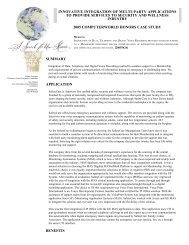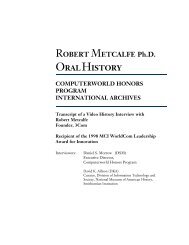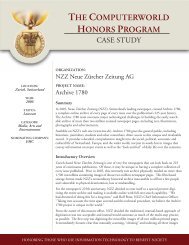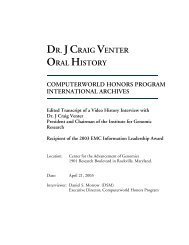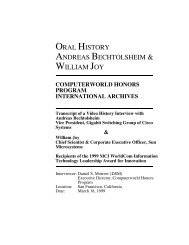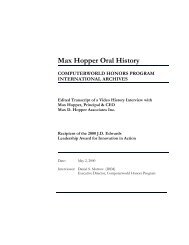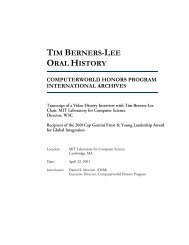NATHAN MYHRVOLD PhD ORAL HISTORY - The Computerworld ...
NATHAN MYHRVOLD PhD ORAL HISTORY - The Computerworld ...
NATHAN MYHRVOLD PhD ORAL HISTORY - The Computerworld ...
Create successful ePaper yourself
Turn your PDF publications into a flip-book with our unique Google optimized e-Paper software.
Maybe in retrospect, we’ll discover 25 years from now that there’s some fear, but the<br />
only way it goes is by exploring, so you’ve got to do some things like that.<br />
Another thing that influences the way we do research at Microsoft is that we’re very<br />
open about our research. A lot of companies try to make research an armed camp<br />
thing, protect it. Getting in to see the research group is very, very difficult because<br />
they don’t want to lose an idea, and people have to go through a formal permission<br />
process to publish a paper or even go to a conference. We have none of that. We<br />
just trust our people. We tell them that if you think there’s a patent for this other<br />
thing, you should file for that before you go talk to banks. It turns out if you can’t<br />
trust your people, no amount of process will save you. If you do trust your people,<br />
they will feel more responsible than you’d ever make them be. Most important of<br />
all, you need to exchange with the rest of the outside world. How do I know that<br />
some very obscure part of research is going well? How does anybody at Microsoft<br />
know that my dinosaur research is worth a damn? <strong>The</strong>re’s no other dinosaur expert.<br />
But if you work in the open research community, if you publish in peer review<br />
journals, if you go to conferences others are only too happy to point out your<br />
shortcomings. So it’s a very healthy part of managing a research group. You have to<br />
have contact with the outside research community. Only a small fraction of the<br />
world’s IQ is going be inside your organization, under your roof. If you cut<br />
yourselves off from them, you’re not only cutting themselves from their wisdom, but<br />
they’re helping managing what you’re doing. So one of the many things that go into<br />
whether you continue a project is how it is doing relative to the rest of the field. If<br />
we’re keeping up with the rest of the field, and the whole field is stuck, then you’re<br />
going to have to decide whether you get rid of the field, or just slug in there. If<br />
you’re doing substantially worse than everyone, then that’s a flag. It doesn’t mean<br />
you stop, because sometimes going in a completely different direction is what gets<br />
you to the goal.<br />
DA: Can you talk about your work with Phil Currie?<br />
NM: I’ve been in interested in dinosaurs ever since I was a kid, I’ve been interested<br />
in a lot of things actually since then, and many of them completely go away. Yet at<br />
various points, there’ll be some opportunity and I’ll get more involved in one or<br />
another. My interest in cooking led a few years ago, to me going to a professional<br />
Chef school in France, and working as an apprentice in a restaurant in Seattle. I just<br />
went one night a week to get my apprenticeship.<br />
Nathan Myhrvold<br />
Oral History<br />
36



